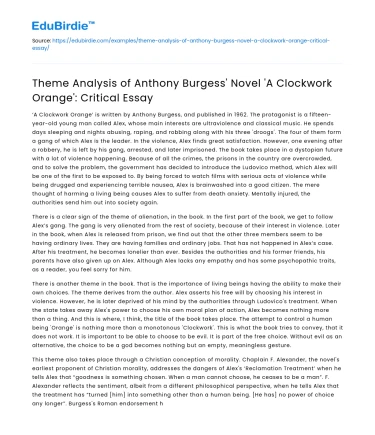‘A Clockwork Orange’ is written by Anthony Burgess, and published in 1962. The protagonist is a fifteen-year-old young man called Alex, whose main interests are ultraviolence and classical music. He spends days sleeping and nights abusing, raping, and robbing along with his three 'droogs'. The four of them form a gang of which Alex is the leader. In the violence, Alex finds great satisfaction. However, one evening after a robbery, he is left by his gang, arrested, and later imprisoned. The book takes place in a dystopian future with a lot of violence happening. Because of all the crimes, the prisons in the country are overcrowded, and to solve the problem, the government has decided to introduce the Ludovico method, which Alex will be one of the first to be exposed to. By being forced to watch films with serious acts of violence while being drugged and experiencing terrible nausea, Alex is brainwashed into a good citizen. The mere thought of harming a living being causes Alex to suffer from death anxiety. Mentally injured, the authorities send him out into society again.
There is a clear sign of the theme of alienation, in the book. In the first part of the book, we get to follow Alex’s gang. The gang is very alienated from the rest of society, because of their interest in violence. Later in the book, when Alex is released from prison, we find out that the other three members seem to be having ordinary lives. They are having families and ordinary jobs. That has not happened in Alex’s case. After his treatment, he becomes lonelier than ever. Besides the authorities and his former friends, his parents have also given up on Alex. Although Alex lacks any empathy and has some psychopathic traits, as a reader, you feel sorry for him.
There is another theme in the book. That is the importance of living beings having the ability to make their own choices. The theme derives from the author. Alex asserts his free will by choosing his interest in violence. However, he is later deprived of his mind by the authorities through Ludovico's treatment. When the state takes away Alex's power to choose his own moral plan of action, Alex becomes nothing more than a thing. And this is where, I think, the title of the book takes place. The attempt to control a human being 'Orange' is nothing more than a monotonous 'Clockwork'. This is what the book tries to convey, that it does not work. It is important to be able to choose to be evil. It is part of the free choice. Without evil as an alternative, the choice to be a god becomes nothing but an empty, meaningless gesture.
This theme also takes place through a Christian conception of morality. Chaplain F. Alexander, the novel's earliest proponent of Christian morality, addresses the dangers of Alex's ‘Reclamation Treatment’ when he tells Alex that “goodness is something chosen. When a man cannot choose, he ceases to be a man”. F. Alexander reflects the sentiment, albeit from a different philosophical perspective, when he tells Alex that the treatment has “turned [him] into something other than a human being. [He has] no power of choice any longer”. Burgess's Roman endorsement has shown up morally as an issue. About choices and determination and argues that good behavior is meaningless if one does not actively choose goodness.
Alex and his friends are, at the beginning of the book, very alienated from the rest of society. Through their ultraviolence they derive further and further away from civilization. Alex later loses his friends and he is all by himself. After the treatment, he cannot make his own choices anymore. The book asks the main question: what happens to a person after being both alienated and not being able to make his own decisions?






 Stuck on your essay?
Stuck on your essay?

